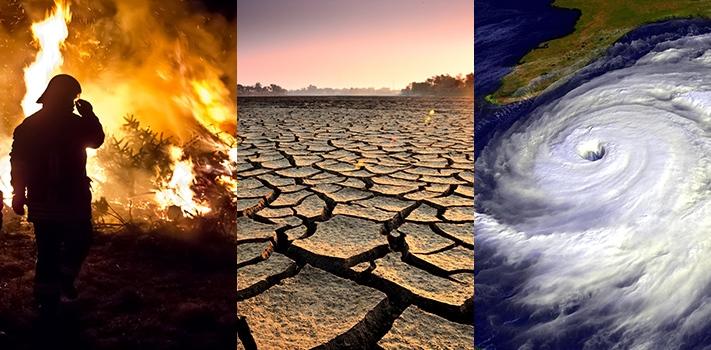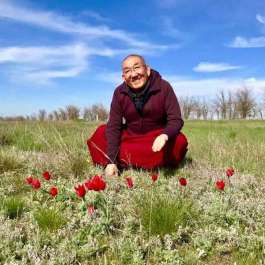
When we consider the ever-more-frequent headlines about large-scale devastation wrought by climate change, we see a metaphor for the human experience of suffering writ large. The epic proportions of distress caused by super-storms are like a global version of the suffering we may have felt in our own hearts as we came to the Dharma in the first place. This parallel is highlighted in The Time to Act is Now, a Buddhist Declaration on Climate Change. In this declaration, the environmental crisis is viewed through the lens of the Four Noble Truths, leading us through the challenge of suffering and into a state of energetic readiness in our intentions and actions on behalf of Mother Earth and all sentient beings who share this planetary home.
In the words of the authors, Zen teacher Dr David Tetsuun Loy, Theravadin teacher Ven. Bhikkhu Bodhi, and scientist Dr John Stanley:
The four noble truths provide a framework for diagnosing our current situation and formulating appropriate guidelines – because the threats and disasters we face ultimately stem from the human mind, and therefore require profound changes within our minds. If personal suffering stems from craving and ignorance—from the three poisons of greed, ill will, and delusion—the same applies to the suffering that afflicts us on a collective scale. Our ecological emergency is a larger version of the perennial human predicament.
In the First Noble Truth, the Buddha pointed to the experience of suffering (dukkha in Pali) that underlies much of our human experience, and which is unavoidable for those of us who are still bound by the cycle of samsara. Looking at the plight of the world today, it is clear that the Earth is suffering on a massive scale from the indignities and exploitations of our human activities. Some of this distress may seem unavoidable, while much of it could be mitigated by the wise, concerted efforts of a community of people who are awake to the truth and who care. This is not unlike our own personal experiences of dukkha, which may have some particular causes that seem unavoidable, and yet which we embroider into much more painful events by our own unskillful beliefs and actions.
Our constant, uneasy craving for something different, better, more – the Second Noble Truth – drives us relentlessly. As the authors of the Declaration state, it is that very impetus toward consumption and acquisition in our efforts to numb the pain we feel that has led our planet to the brink of disaster. Especially in the West, we have sought endlessly to extort resources from the body of the Earth, often in less affluent countries and regions. These resources are then fashioned into objects, drugs, and services meant to keep us comfortable – only, it never works for very long. It is a really hopeless approach, as we consume so many irreplaceable resources in pursuit of a goal – comfort – that cannot be achieved and maintained unceasingly.
There is hope, however. The promise of the Third Noble Truth is that there is a way out of this crazy scary game, there is the possibility of cessation of the unwinnable back and forth between wanting and suffering and gaining and losing and suffering some more. Just as our seemingly hopeless human experience of samsara can be effectively redirected by the Dharma toward liberation, so can the seemingly hopeless environmental crisis we are living in the midst of be turned around. And in a beautiful synchrony, the very same realignment of values and behaviors that free us from the bondage of craving and suffering as individuals, will also serve to slow down and ultimately turn around climate catastrophe toward a truly healthy and sustainable future.
The Fourth Noble Truth sets out the steps leading to that freedom. It is comprised of the Noble Eightfold Path, factors to be developed in our efforts toward awakening. Seeing through the lens of Wise View is the foundation we start from, as climate change denial is still a place where many people comfortably numb out, rather than face the pain of the mess we have created as a species. Wise Intention must guide our Wise Efforts, with the goal of doing no harm to the planet as we move forward with Wise Action. Wise Speech is called for in all of us who seek to both sound the alarm and rally our joint efforts to effect positive change. We may all pursue Wise Livelihood, seeking to support ourselves in ways that do not cause further destruction of the environment. For those of us who are engaged in this activism, Wise Mindfulness helps us remain aware of the effects of our own choices, and Wise Concentration supports us in staying committed over the long term with clarity and focus.
In pointing to the Four Noble Truths as a “framework” for understanding the experience of climate disruption, the Declaration asks us to consider how we have personally and collectively participated in the damage and distress that have been wrought upon the Earth. It also suggests ways that we may work individually as part of a broader movement to find freedom from these unskillful ways of relating to the Earth and her resources. And in that movement, all beings may again be blessed with an environment that is healthy and supportive of all of our awakening from suffering.











